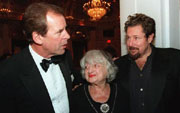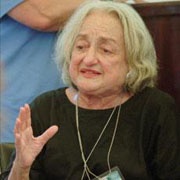VOA慢速英语2011--Betty Friedan, 1921-2006: A Leader of the Modern Women’s Rights Movement
时间:2018-12-07 作者:英语课 分类:2011年VOA慢速英语(十)月
PEOPLE IN AMERICA - Betty Friedan, 1921-2006: A Leader of the Modern Women’s Rights Movement
FAITH LAPIDUS: I’m Faith Lapidus.
STEVE EMBER: And I’m Steve Ember with PEOPLE IN AMERICA in VOA Special English. Today we tell about Betty Friedan. She was a powerful activist 1 for the rights of women.
(MUSIC)
FAITH LAPIDUS: Betty Friedan is often called “the mother of the modern women’s liberation movement.” Her famous book, “The Feminine Mystique,” changed America. Some people say it changed the world. It has been called one of the most influential 2 nonfiction books of the twentieth century.
Friedan re-awakened the feminist 3 movement in the United States. That movement had helped women gain the right to vote in the nineteen twenties. Modern feminists 4 disagree about how to describe themselves and their movement. But activists 5 say men and women should have equal chances for economic, social and intellectual satisfaction in life.

Peter Jennings, left, Betty Friedan, center, and Julian Schnabel stop for a chat after receiving Lifetime Achievment Awards from the Academy of the Arts in New York
STEVE EMBER: Fifty years ago, life for women in the United States was very different from today. Very few parents urged their daughters to become lawyers or doctors or professors. Female workers doing the same jobs as men earned much less money. Women often lost their jobs when they had a baby. There were few child-care centers for working parents.
Betty Friedan once spoke 6 to ABC television about her support for sharing responsibility for the care of children.
BETTY FRIEDAN: “If child-rearing was considered the responsibility of women and men or women and men and society, then we really could pull up our skirts and declare victory and move on.”
(MUSIC)
FAITH LAPIDUS: Betty Friedan was born Betty Goldstein in nineteen twenty-one in Peoria, Illinois. Her immigrant father worked as a jeweler. Her mother left her job with a local newspaper to stay home with her family.

Betty Friedan laid the groundwork for the modern feminist movement
Betty attended Smith College in Northhampton, Massachusetts. It was one of the country’s best colleges for women. She finished her studies in psychology 7 in nineteen forty-two.
After college she attended the University of California at Berkeley to continue her studies. Her boyfriend at the time did not want her to get an advanced degree in psychology. He apparently 8 felt threatened by her success. So Betty left California and her boyfriend. She moved to New York City and worked as a reporter and editor for labor 9 union newspapers.
In nineteen forty-seven, Betty Goldstein married Carl Friedan, a theater director who later became an advertising 10 executive. They had a child, the first of three. The Friedans were to remain married until nineteen sixty-nine.
(MUSIC)
STEVE EMBER: When Betty Friedan became pregnant for the second time, she was dismissed from her job at the newspaper. After that she worked as an independent reporter for magazines. But her editors often rejected her attempts to write about subjects outside the traditional interests of women.
In nineteen fifty-seven, Friedan started research that was to have far-reaching results. Her class at Smith College was to gather for the fifteenth anniversary of their graduation. Friedan prepared an opinion study for the women. She sent questions to the women about their lives. Most who took part in the study did not work outside their homes.
Friedan was not completely satisfied with her life. She thought that her former college classmates might also be dissatisfied. She was right. Friedan thought these intelligent women could give a lot to society if they had another identity besides being homemakers.
FAITH LAPIDUS: Friedan completed more studies. She talked to other women across the country. She met with experts about the questions and answers. She combined this research with observations and examples from her own life. The result was her book, “The Feminine Mystique,” published in nineteen sixty-three.
The book attacked the popular idea of the time that women could only find satisfaction through being married, having children and taking care of their home. Friedan believed that women wanted more from life than just to please their husbands and children.

She said in 1995 that the women's movement must move away from "sexual politics" to work with men in humanity's common interest
The book said women suffered from feelings of lack of worth. Friedan said this was because the women depended on their husbands for economic, emotional and intellectual support.
STEVE EMBER: “The Feminine Mystique” was a huge success. It has sold more than three million of copies. It was reprinted in a number of other languages. The book helped change the lives of women in America. More women began working outside the home. More women also began studying traditionally male subjects like law, medicine and engineering.
Betty Friedan expressed the dissatisfaction of some American women during the middle of the twentieth century. But she also made many men feel threatened. Later, critics said her book only dealt with the problems of white, educated, wealthy, married women. It did not study the problems of poor white women, single women or minorities.
(MUSIC)
FAITH LAPIDUS: In nineteen sixty-six, Betty Friedan helped establish NOW, the National Organization for Women. She served as its first president. She led campaigns to end unfair treatment of women seeking jobs.
BETTY FRIEDAN: “We are now strong enough ourselves to see men not as bread winners, not as instruments, not as sex objects, not as enemies, not as stereotypes 11, but human beings, our brothers.”
FAITH LAPIDUS: Friedan also worked on other issues. She wanted women to have the choice to end their pregnancies 12. She wanted to create child-care centers for working parents. She wanted women to take part in social and political change. Betty Friedan once spoke about her great hopes for women in the nineteen seventies.
BETTY FRIEDAN: “Liberating ourselves, we will then become a major political force, perhaps the biggest political force for basic social and political change in America in the seventies.”
STEVE EMBER: Betty Friedan led a huge demonstration 13 in New York City for women’s rights. Demonstrations 14 were also held in other cities. A half-million women took part in the Women’s Strike for Equality on August twenty-sixth, nineteen seventy. The day marked the fiftieth anniversary of American women gaining the right to vote.
A year after the march, Friedan helped establish the National Women’s Political Caucus 15. She said the group got started “to make policy, not coffee.” She said America needed more women in public office if women were to gain equal treatment.
FAITH LAPIDUS: Friedan wanted a national guarantee of that equal treatment. She worked tirelessly to get Congress and the states to approve an amendment 16 to the United States Constitution that would provide equal rights for women.

Betty Friedan and Lt. Gov. Kathleen Kennedy Townsend at the Feminist Expo 2000 in Baltimore, Maryland
The House of Representatives approved this Equal Rights Amendment in nineteen seventy-one. The Senate approved it the following year. Thirty-eight of the fifty state legislatures were required to approve the amendment. Congress set a time limit of seven years for the states to approve it. This was extended to June thirtieth, nineteen eighty-two. However, only thirty-five states approved the amendment by the deadline so it never went into effect.
The defeat of the E.R.A. was a sad event for Betty Friedan, NOW, and other activists.
(MUSIC)
STEVE EMBER: In nineteen eighty-one, Betty Friedan wrote about the condition of the women’s movement. Her book was called “The Second Stage.” Friedan wrote that the time for huge demonstrations and other such events had passed. She urged the movement to try to increase its influence on American political life.
Some younger members of the movement denounced her as too conservative.
As she grew older, Friedan studied conditions for older Americans. She wrote a book called “The Fountain of Age” in nineteen ninety-three. She wrote that society often dismisses old people as no longer important or useful. Friedan’s last book was published in two thousand. She was almost eighty years old at the time. Its title was “Life So Far.”
Betty Friedan died on February fourth, two thousand six. It was her eighty-fifth birthday. Betty Friedan once told a television reporter how she wanted to be remembered.
BETTY FRIEDAN: “She helps make it better for women to feel good about being women, and therefore she helped make it possible for women to more freely love men.”
(MUSIC)
FAITH LAPIDUS: This program was written by Jerilyn Watson. It was produced by Lawan Davis. I’m Faith Lapidus.
STEVE EMBER: And I’m Steve Ember. You can download a transcript 17 and audio of this show at voanews.cn. Join us again next week for PEOPLE IN AMERICA in VOA Special English.
- He's been a trade union activist for many years.多年来他一直是工会的积极分子。
- He is a social activist in our factory.他是我厂的社会活动积极分子。
- He always tries to get in with the most influential people.他总是试图巴结最有影响的人物。
- He is a very influential man in the government.他在政府中是个很有影响的人物。
- She followed the feminist movement.她支持女权运动。
- From then on,feminist studies on literature boomed.从那时起,男女平等受教育的现象开始迅速兴起。
- Only 16 percent of young women in a 1990 survey considered themselves feminists. 在1990年的一项调查中,只有16%的年轻女性认为自己是女权主义者。 来自辞典例句
- The organization had many enemies, most notably among feminists. 这个组织有许多敌人,特别是在男女平等主义者中。 来自辞典例句
- His research work was attacked by animal rights activists . 他的研究受到了动物权益维护者的抨击。
- Party activists with lower middle class pedigrees are numerous. 党的激进分子中有很多出身于中产阶级下层。 来自《简明英汉词典》
- They sourced the spoke nuts from our company.他们的轮辐螺帽是从我们公司获得的。
- The spokes of a wheel are the bars that connect the outer ring to the centre.辐条是轮子上连接外圈与中心的条棒。
- She has a background in child psychology.她受过儿童心理学的教育。
- He studied philosophy and psychology at Cambridge.他在剑桥大学学习哲学和心理学。
- An apparently blind alley leads suddenly into an open space.山穷水尽,豁然开朗。
- He was apparently much surprised at the news.他对那个消息显然感到十分惊异。
- We are never late in satisfying him for his labor.我们从不延误付给他劳动报酬。
- He was completely spent after two weeks of hard labor.艰苦劳动两周后,他已经疲惫不堪了。
- Can you give me any advice on getting into advertising? 你能指点我如何涉足广告业吗?
- The advertising campaign is aimed primarily at young people. 这个广告宣传运动主要是针对年轻人的。
- Such jokes tend to reinforce racial stereotypes. 这样的笑话容易渲染种族偏见。
- It makes me sick to read over such stereotypes devoid of content. 这种空洞无物的八股调,我看了就讨厌。 来自《现代汉英综合大词典》
- Since the wartime population needed replenishment, pregnancies were a good sign. 最后一桩倒不失为好现象,战时人口正该补充。
- She's had three pregnancies in four years. 她在四年中怀孕叁次。
- His new book is a demonstration of his patriotism.他写的新书是他的爱国精神的证明。
- He gave a demonstration of the new technique then and there.他当场表演了这种新的操作方法。
- Lectures will be interspersed with practical demonstrations. 讲课中将不时插入实际示范。
- The new military government has banned strikes and demonstrations. 新的军人政府禁止罢工和示威活动。
- This multi-staged caucus takes several months.这个多级会议常常历时好几个月。
- It kept the Democratic caucus from fragmenting.它也使得民主党的核心小组避免了土崩瓦解的危险。
- The amendment was rejected by 207 voters to 143.这项修正案以207票对143票被否决。
- The Opposition has tabled an amendment to the bill.反对党已经就该议案提交了一项修正条款。
- A transcript of the tapes was presented as evidence in court.一份录音带的文字本作为证据被呈交法庭。
- They wouldn't let me have a transcript of the interview.他们拒绝给我一份采访的文字整理稿。